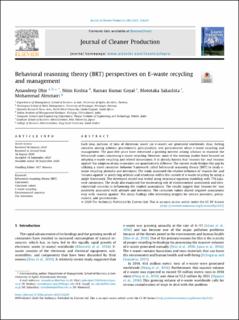Behavioral reasoning theory (BRT) perspectives on E-waste recycling and management
Peer reviewed, Journal article
Published version
Permanent lenke
https://hdl.handle.net/11250/3052651Utgivelsesdato
2021Metadata
Vis full innførselSamlinger
Originalversjon
Dhir, A., Koshta, N., Goyal, R. K., Sakashita, M., & Almotairi, M. (2021). Behavioral reasoning theory (BRT) perspectives on E-waste recycling and management. Journal of Cleaner Production, 280, 124269. 10.1016/j.jclepro.2020.124269Sammendrag
Each year, millions of tons of electronic waste (or e-waste) are generated worldwide, thus, fueling concerns among scholars, practitioners, policymakers, and governments about e-waste recycling and management. The past few years have witnessed a growing interest among scholars to examine the behavioral issues concerning e-waste recycling. However, most of the existing studies have focused on adopting e-waste recycling and related innovations. It is already known that ‘reasons for’ and ‘reasons against’ the adoption of any innovation are quantitatively different. The current study bridges this gap by utilizing a novel consumer behavior framework called behavioral reasoning theory (BRT) to study e-waste recycling attitudes and intentions. The study examined the relative influence of ‘reasons for’ and ‘reasons against’ in predicting attitude and intentions within the context of e-waste recycling by using a single framework. The developed model was tested using structural equation modeling with 774 Japanese consumers. The study also examined the moderating role of environmental assessment and environmental concerns in influencing the studied associations. The results suggest that ‘reasons for’ was positively associated with attitude and intentions. The consumer values shared negative associations only with ‘reasons against.’ The study findings offer interesting insights for service providers, policymakers, and governments.

